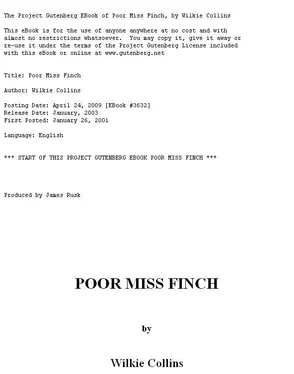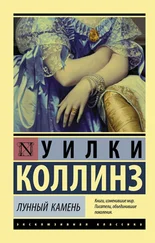Уилки Коллинз - Poor Miss Finch
Здесь есть возможность читать онлайн «Уилки Коллинз - Poor Miss Finch» весь текст электронной книги совершенно бесплатно (целиком полную версию без сокращений). В некоторых случаях можно слушать аудио, скачать через торрент в формате fb2 и присутствует краткое содержание. Год выпуска: 2002, Жанр: Классическая проза, на английском языке. Описание произведения, (предисловие) а так же отзывы посетителей доступны на портале библиотеки ЛибКат.
- Название:Poor Miss Finch
- Автор:
- Жанр:
- Год:2002
- ISBN:нет данных
- Рейтинг книги:3 / 5. Голосов: 1
-
Избранное:Добавить в избранное
- Отзывы:
-
Ваша оценка:
- 60
- 1
- 2
- 3
- 4
- 5
Poor Miss Finch: краткое содержание, описание и аннотация
Предлагаем к чтению аннотацию, описание, краткое содержание или предисловие (зависит от того, что написал сам автор книги «Poor Miss Finch»). Если вы не нашли необходимую информацию о книге — напишите в комментариях, мы постараемся отыскать её.
Poor Miss Finch — читать онлайн бесплатно полную книгу (весь текст) целиком
Ниже представлен текст книги, разбитый по страницам. Система сохранения места последней прочитанной страницы, позволяет с удобством читать онлайн бесплатно книгу «Poor Miss Finch», без необходимости каждый раз заново искать на чём Вы остановились. Поставьте закладку, и сможете в любой момент перейти на страницу, на которой закончили чтение.
Интервал:
Закладка:
Mr. Finch rose from his seat, with the air of a man whose just anticipations have not been realized—whose innocent confidence has been scandalously betrayed. Here was a prospect! Another person in perpetual want of money, going to settle under the shadow of the rectory! Another man likely to borrow of Oscar—and that man his brother!
"I fail to take your light view of your brother's extravagance," said the rector, addressing Oscar with his loftiest severity of manner, at the door. "I deplore and reprehend Mr. Nugent's misuse of the bounty bestowed on him by an all-wise Providence. You will do well to consider, before you encourage your brother's extravagance by lending him money. What does the great poet of humanity say of lenders? The Bard of Avon tells us, that 'loan oft loses both itself and friend.' Lay that noble line to heart, Oscar! Lucilla, be on your guard against that restlessness which I have already had occasion to reprove. I find I must leave you, Madame Pratolungo. I had forgotten my parish duties. My parish duties are waiting for me. Good day! good day!"
He looked round on us all three, in turn, with a very sour face, and walked out. "Surely," I thought to myself, "this brother of Oscar's is not beginning well! First, the daughter takes offense at him, and now the father follows her example. Even on the other side of the Atlantic, Mr. Nugent Dubourg exercises a malignant influence, and disturbs the family tranquillity before he has shown his nose in the house!"
Nothing more that is worth recording happened on that day. We had a very dull evening. Lucilla was out of spirits. As for me, I had not yet had time to accustom myself to the shocking spectacle of Oscar's discolored face. I was serious and silent. You would never have guessed me to be a Frenchwoman, if you had seen me for the first time on the occasion of my return to the rectory.
The next day a small domestic event happened, which must be chronicled in this place.
Our Dimchurch doctor, always dissatisfied with his position in an obscure country place, had obtained an appointment in India which offered great professional advantages to an ambitious man. He called to take leave of us on his departure. I found an opportunity of speaking to him about Oscar. He entirely agreed with me that the attempt to keep the change produced in his former patient by the Nitrate of Silver from Lucilla's knowledge, was simply absurd. The truth would reach her, he said, before many days were over our heads. With that prediction, addressed to my private ear, he left us. The removal of him from the scene was, you will please to bear in mind, the removal of an important local witness to the medical treatment of Oscar, and was, as such, an incident with a bearing of its own on the future, which claims a place for it in the present narrative.
Two more days passed, and nothing happened. On the morning of the third day, the doctor's prophecy was all but fulfilled, through the medium of the wandering Arab of the family, our funny little Jicks.
While Lucilla and I were strolling about the garden with Oscar, the child suddenly darted out on us from behind a tree, and, seizing Oscar round the legs, hailed him affectionately at the top of her voice as "The Blue Man!" Lucilla instantly stopped, and said, "Who do you call 'The Blue Man'?" Jicks answered boldly, "Oscar." Lucilla caught the child up in her arms. "Why do you call Oscar 'The Blue Man'?" she asked. Jicks pointed to Oscar's face, and then, remembering Lucilla's blindness, appealed to me. "You tell her!" said Jicks, in high glee. Oscar seized my hand, and looked at me imploringly. I determined not to interfere. It was bad enough to remain passive, and to let her be kept in the dark. Actively, I was resolved to take no part in deceiving her. Her color rose; she put Jicks down on the ground. "Are you both dumb?" she asked. "Oscar! I insist on knowing it—how have you got the nick-name of 'The Blue Man'?" Left helpless, Oscar (to my disgust) took refuge in a lie—and, worse still, a clumsy lie. He declared that he had got his nick-name in the nursery, at the time of Lucilla's absence in London, by one day painting his face in the character of Bluebeard to amuse the children! If Lucilla had felt the faintest suspicion of the truth, blind as she was, she must now have discovered it. As things were, Oscar annoyed and irritated her. I could see that it cost her a struggle to suppress something like a feeling of contempt for him. "Amuse the children, the next time, in some other way," she said. "Though I can't see you, still I don't like to hear of your disfiguring your face by painting it blue." With that answer, she walked away a little by herself, evidently disappointed in her betrothed husband for the first time in her experience of him.
He cast another imploring look at me. "Did you hear what she said about my face?" he whispered.
"You have lost an excellent opportunity of speaking out," I answered. "I believe you will bitterly regret the folly and the cruelty of deceiving her."
He shook his head, with the immovable obstinacy of a weak man.
"Nugent doesn't think as you do," he said, handing me the letter. "Read that bit there—now Lucilla is out of hearing."
I paused for a moment before I could read. The resemblance between the twins extended even to their handwritings! If I had picked Nugent's letter up, I should have handed it to Oscar as a letter of Oscar's own writing.
The paragraph to which he pointed, only contained these lines:—"Your last relieves my anxiety about your health. I entirely agree with you that any personal sacrifice which cures you of those horrible attacks is a sacrifice wisely made. As to your keeping the change a secret from the young lady, I can only say that I suppose you know best how to act in this emergency. I will abstain from forming any opinion of my own until we meet."
I handed Oscar back the letter.
"There is no very warm approval there of the course you are taking," I said. "The only difference between your brother and me is, that he suspends his opinion, and that I express mine."
"I have no fear of my brother," Oscar answered. "Nugent will feel for me, and understand me, when he comes to Browndown. In the meantime, this shall not happen again."
He stooped over Jicks. The child, while we were talking, had laid herself down luxuriously on the grass, and was singing to herself little snatches of a nursery song. Oscar pulled her up on her legs rather roughly. He was out of temper with her, as well as with himself.
"What are you going to do?" I asked.
"I am going to see Mr. Finch," he answered, "and to have Jicks kept for the future out of Lucilla's garden."
"Does Mr. Finch approve of your silence?"
"Mr. Finch, Madame Pratolungo, leaves me to decide on a matter which concerns nobody but Lucilla and myself."
After that reply, there was an end of all further remonstrance from me, as a matter of course.
Oscar walked off with his prisoner to the house. Jicks trotted along by his side, unconscious of the mischief she had done, singing another verse of the nursery song. I rejoined Lucilla, with my mind made up as to the line of conduct I should adopt in the future. If Oscar did succeed in keeping the truth concealed from her, I was positively resolved, come what might of it, to enlighten her before they were married, with my own lips. What! after pledging myself to keep the secret? Yes. Perish the promise which makes me false to a person whom I love! I despise such promises from the bottom of my heart.
Two days more slipped by—and then a telegram found its way to Browndown. Oscar came running to us, at the rectory, with his news. Nugent had landed at Liverpool. Oscar was to expect him at Dimchurch on the next day.
CHAPTER THE TWENTY-THIRD
Интервал:
Закладка:
Похожие книги на «Poor Miss Finch»
Представляем Вашему вниманию похожие книги на «Poor Miss Finch» списком для выбора. Мы отобрали схожую по названию и смыслу литературу в надежде предоставить читателям больше вариантов отыскать новые, интересные, ещё непрочитанные произведения.
Обсуждение, отзывы о книге «Poor Miss Finch» и просто собственные мнения читателей. Оставьте ваши комментарии, напишите, что Вы думаете о произведении, его смысле или главных героях. Укажите что конкретно понравилось, а что нет, и почему Вы так считаете.






